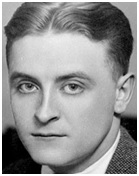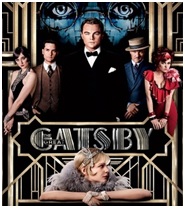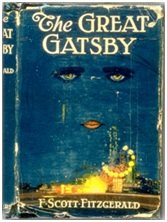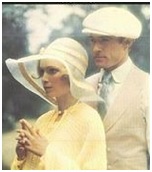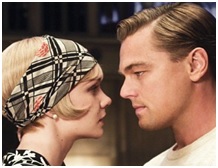|
 |
|
 |
The Great Gatsby - Happiness and Success
The Great Gatsby (1925)
Written by the American, Scott Fitzgerald (1896-1940), pictured right.
Fun facts
Key characters (Jay) Gatsby, a rich young man, around 30-years-old. Nick Carraway, Gatsby’s neighbour and friend, and the book’s narrator Daisy (Buchanan), Nick’s cousin who Gatsby loves Tom (Buchanan), Daisy’s rich husband
The story In the summer of 1922, Nick Carraway, a young Yale graduate, rents a house in Long Island,
near his cousin, Daisy, and her wealthy husband, Tom Buchanan, a Yale friend.
They invite him for dinner and Nick begins a romance with Jordan Baker, a professional
golfer. Jordan tells him that Tom is having an affair with Myrtle Wilson who lives in the Valley of the Ashes, a poor area where New York's industrial waste is burned and dumped. Tom later punches Myrtle for making fun of Daisy. Nick is intrigued by his neighbour, Jay Gatsby, who lives in a gothic mansion and has wild, extravagant parties every Saturday night. Nick is invited to one. Gatsby puts on an English accent, has a wonderful smile and calls everyone “old sport”. He is still deeply in love with Daisy, whom he met in the army in 1917 (pictured together below in the 1974 film). He frequently stares out at a green light across the water where she lives. He eventually starts an affair with her that infuriates Tom. At the Plaza Hotel, New York, he confronts Gatsby,
who is stunned when Daisy says that she loves them both. Tom then tells Daisy that Gatsby’s fortune comes from bootlegging alcohol and other crimes, persuading her to abandon him. But Tom suggests they drive back home together in Gatsby's car to prove he can’t hurt their marriage anymore. Returning home, Nick, Jordan and Tom discover that Gatsby’s car has struck and killed Tom’s lover, Myrtle. Gatsby takes the blame for the killing, even though Daisy was driving. Tom tells Myrtle’s husband George, who shoots Gatsby by his pool before killing himself. Nick organizes Gatsby's funeral, which only his father and one other person attend. Nick returns home to Minnesota disgusted with people's shallow immorality and ruthless destruction of Gatsby.
What does this say about happiness and success?
1. Morals matter Gatsby appears to be the embodiment of the American Dream, a self-made man, rich and successful. But actually he’s a bootlegger, making his fortune selling illegal alcohol during the Prohibition. However, Nick still calls him “great”, because of his
In contrast:
Daisy refuses to take responsibility for Myrtle's death, so condemning Gatsby. Gatsby (Leonardo DiCaprio) and Daisy (Carey Mulligan) are pictured together right in the 2013 film.
2. Be true to yourself Gatsby disastrously pretends to be someone he isn’t, forgetting his poor background in pursuit of the posh Daisy. 3. Treasure your friends and family Gatsby’s wealth attracts many fair-weather friends but they all abandon him including even Daisy. He sadly:
4. Money isn’t everything Gatsby’s wealth doesn’t win Daisy. Gatsby foolishly believes that money and status are more important than family and friends. Daisy sacrifices her love for Gatsby, because she thinks that Tom will be a richer and socially superior husband.
5. Know what true love is Gatsby is infatuated with Daisy based upon an idealized view of her. It isn’t true love that comes from:
Tom is the antithesis of love, being:
6. Don’t live in the past Gatsby tries to win back Daisy, but it is impossible because she’s married and socially superior. The past can be very alluring, but, once it's lost, you can't build a future on it. This explains the book's last words: “So we beat on, boats against the current, borne back ceaselessly into the past”. 7. Change or die Gatsby’s disastrous obsession with Daisy shows you must:
Nick realises at the age of 30 that, if he does nothing, he will be faced with: “loneliness, a thinning list of single men to know, a thinning brief-case of enthusiasm, thinning hair”.
8. Charisma counts Gatsby wins Nick over with his charm, wonderful smile and “extraordinary gift for hope”.
Key quote on stress and success (by Nick Carraway) There are only the pursued, the pursuing, the busy and the tired.
Key quote on society (by Nick Carraway) The rich get richer and the poor get – children.
Key quote on relationships (by Nick Carraway) They were careless people, Tom and Daisy – they smashed up things and creatures ... and let other people clean up the mess they had made.
Key quote on money (by Nick Carraway) Her voice is full of money (about Daisy).
Key quote on change (by Nick Carraway) So we beat on, boats against the current, borne back ceaselessly into the past, the novel’s last words.
Two literature websites to recommend 1. sparknotes.com 2. litcharts.com |
|
|
||
|
|
|
||
|
||
| Copyright © wisdomtowin.com All Rights Reserved | ||
|

